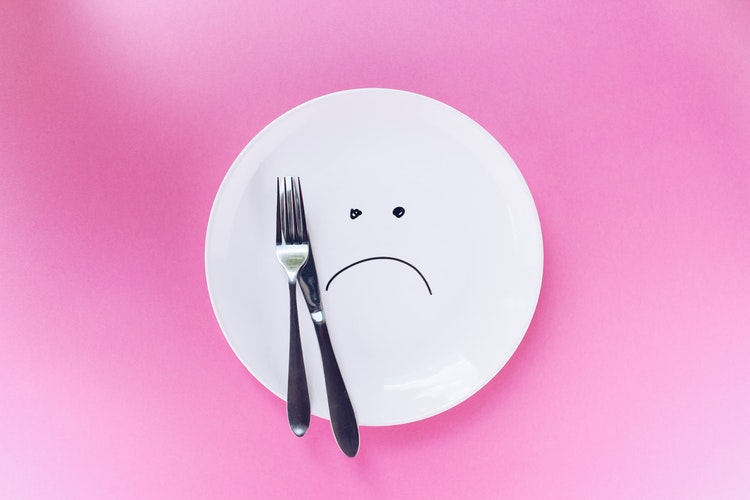This is the ONLY Diet You'll Ever Need for the Menopause
Jun 01, 2019
The Mediterranean diet. Weight Watchers. Slimming World. The vegan diet. Keto-Alkaline. Paleo. The Cabbage Soup diet….
If you’ve ever tried to lose weight, you’ve probably heard about all of these slimming diets and probably even tried a fair few of them too.
Speak to anyone who has successfully lost weight with any of them, and you’ll be enthusiastically told that the diet in question is ‘the best diet ever’ and ‘the only diet you’ll ever need’ or even ‘the only diet that works!’
You might have noticed that it doesn’t matter which of these diets the person is talking about, their claims are the same; this diet is the perfect solution for weight loss.
So today I’d like to take a look at slimming diets in general and help you understand the truth behind the myths. Which of these is the best diet for you during the menopause?
Let’s take a look.
The problem with diets

Before we go much further, it’s important to first to mention what most of these diets have in common and what the pros and cons of this can be.
Firstly, many of these diets can be quite restrictive and ask you to remove foods from your diet and start eating others instead. Quite often, this includes foods which have a positive effect on your health and are highly unlikely to impact upon your weight at all and could potentially limit your nutrition and harm your health.
This is a big negative to many diets, which is why I’d recommend that you avoid following any fad diet whatsoever.
Having said that, the majority of these diets do emphasise eating an abundance of unprocessed wholefoods and steering clear of potentially harmful foods such as processed sugars, processed carbs and unhealthy trans fats.
This is brilliant and a big plus for these kinds of well-balanced and sensible eating plans.
How to lose weight during the menopausal years

Many women come to my clinic when they hit the perimenopause or menopause, complaining that it’s harder than ever to lose weight and telling me that they’ve reached the end of their tether.
They want a straightforward eat-this-and-this solution that is guaranteed to shift pounds.
Whilst I can certainly help them and I do help them achieve weight loss through a carefully designed series of diet and lifestyle tweaks, my advice isn’t exactly as they envisioned. You see, there isn’t one solution to weight loss at the menopause.
It depends on your unique biological makeup, your eating philosophy, your menopause symptoms, your health symptoms and much more besides.
The key to healthy and lasting weight loss is to find the diet that best supports your body so you can effortlessly lose weight, get more energy to run around with your kids and grandkids and feel better than ever. Here’s how to do just that.
How to find the right diet for you during the perimenopause or menopause
There’s a place for many of the diets out there, including the Mediterranean diet, vegan diet, Keto-Alkaline diet or Paleo, but that doesn’t mean that it’s right for you at all.
Even if it is, it might not be right for you at this phase of your life. It might be necessary to avoid certain foods temporarily whilst we focus on healing. This might include following the FODMAP diet or Low Oxalate diet.
What do I mean by that?
The truth is, we are constantly changing both inside and out. The diet you’ve been following loyally for many years might not be the best for effectively managing your menopause symptoms or helping you to cope with the hormonal changes that are happening.
However, this can be a difficult pill to swallow, especially if you love the way you eat or believe that your diet doesn’t affect your body. The truth is, what you eat strongly influences every single aspect of your health.
So even if you’re a dedicated fan of a particular diet or you don’t want to change your current diet, I’d highly advise that you reconsider what you’re eating to help you feel better than ever. It might not mean changing much, or anything at all, but it’s certainly a step worth taking.
To find out what’s right for you, it’s important to start listening to your body and make some general dietary tweaks that can help guide you in the right direction. Here’s how you can do that.
1. Keep a food diary

Whatever diet you’re currently following, it’s important to ask yourself how you’re really feeling.
Are you sleeping as soundly as you could be? How are your energy levels? Are you happy with your libido? How about your mood? And your weight?
If the answer to any of these questions is ‘No’, then it’s time to start investigating what could be the root cause.
One of the best ways to do this is to keep a food diary.
Simply write down (in as much detail as you can manage) exactly what you’re eating, including breakfast, lunch, dinner, drinks and those snacks or nibbles throughout the day that it’s easy to forget.
Also, include what time you ate, and for maximum brownie points, be sure to include how you were feeling when you ate.
This can help uncover the relationship you have with food and highlight any potential issues you could be having, or if anything isn’t working optimally for you and your body.
2. Eat regularly & don’t skip meals!
Even if you can’t bear the thought of food in the morning, it’s important that you eat at least something within an hour of waking.
This will help kick-start your metabolism, boost your energy and help you feel much better. It’s especially important if you struggle with low energy, low mood or poor sleep.
After breakfast, aim to eat at least 3-4 hours to allow your blood sugar levels to remain constant throughout the day and provide you with a steady flow of fuel that will help beat brain fog, maintain optimal hormone balance and prevent you from succumbing to food cravings.
Once your blood sugar levels feel more settled and you’re enjoying more energy, you can start to increase the gaps between meals.
3. Enjoy a nutrient-dense diet
If you only do one thing to improve your diet, make sure it’s this: get more nutrients onto your plate!
Make sure you’re eating plenty of wholefoods, aiming for around 7-10 portions of fresh produce per day, more if you can. Include lots of red foods such as red peppers, tomatoes and cherries as they’re particularly high in phytochemicals such vitamins, minerals and cancer-fighting antioxidants.
Also eat plenty of good quality proteins such as beans, pulses, meat, fish, nuts and seeds and reduce your intake of simple carbs like bread, pasta and white rice.
Finally, make sure you’re drinking plenty of water as many menopause symptoms can be worsened if you’re suffering from dehydration.
4. Use food as fuel and pleasure
Just because you’re tweaking your diet to help you feel better, that doesn’t mean you have to simply ‘live to eat’.
That can be utterly joyless and altogether boring. There are still millions of recipes you can create and thousands of new foods you can taste and enjoy that will hit that pleasure button in your brain just as much as the foods you’re used to eating right now. It’s simply a case of finding them!
Open your mind to the different foods that exist. Explore different cuisines from around the world. Treat yourself to some healthy cookery classes or a shiny new cookery book. Enjoy every single bite of food you eat and you will never ever feel deprived.
My favourite not-so-guilty pleasure is a sugar-free flapjack or posh fish and chips. What’s yours?
5. Love your body 100%
The only problem about many diets (especially the fad diets) is that they lead you to see yourself as somehow ‘flawed’. You can’t help but believe their claims, wishing that you had a different body shape and believing that the fact that you don’t yet means that your body is imperfect.
I’d like to take this opportunity to remind you that this simply isn’t true. You’re beautiful.
You aren’t flawed. Your body is absolutely amazing- it does so many incredible things to keep you alive every single day. If you have children, it also helped to conceive, protect and deliver that whole new human being into the world. It’s amazing.
So please, forget about disliking your love handles or wishing your tummy was flatter and love yourself entirely from head to toe.
To recap, there really isn’t such thing as the perfect diet for the menopause. It’s all about finding the right diet for your unique body; understanding which foods help you feel energetic, think clearly and feel wonderful.
Which foods make you feel amazing? Let me know in the comments!





